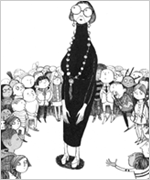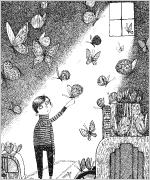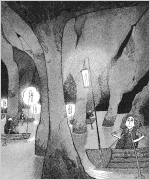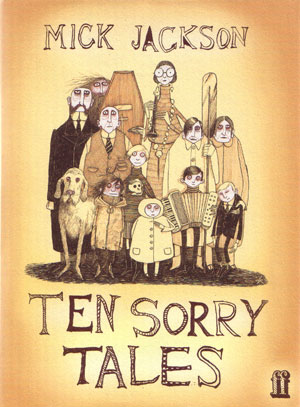From ‘Alien Abduction’

It doesn’t take long for a rumour to do the rounds – especially a rumour concerning alien invasion – and there are few situations better suited to a rumour spreading than a room full of children who are bored to tears. Every time Mister Morgan turned his back there was a great flurry of activity, as Theodore’s note and several other new ones were frantically passed from desk to desk. One of the new notes stated, quite categorically, that ’250 aliens’ had landed. On another, Colin Benson had drawn the actual spaceship – a pointy rocket resting on two wide fins. Beside it he had attempted to draw his own idea of an actual alien, but couldn’t get its head and arms quite right and in a fit of frustration had scribbled it out, which left the impression of a ghostly figure staring out through the interference on a tv screen.
With five minutes still to go before the bell, 4B was in a state of near-hysteria. Mandy Shaw thought she was going to wet herself with excitement. Barry Marsden gripped the edge of his desk so tightly that his knuckles had turned quite white. One or two children had taken the news quite badly. Others thought it was the most exciting thing to happen since the crisp factory went up in flames. A few pupils privately wondered whether the report was 100% accurate. But all were united in their determination to be on their feet as soon as the bell started ringing, to race round to the park and have a good look at this alien spacecraft for themselves.
The moment the bell started ringing the children were out of their chairs and went flying down the corridor. Every child they encountered was told all about the Martian invasion and every one of them instantly chose to join their ranks, until a great stampede of youth was rumbling down the steps and out into the daylight, carrying with it anyone not quick enough to get out of the way.
They piled into the park. They went roaring past the bowling green. They went hammering down the path between the empty tennis courts. They charged through the rose garden, all the way round the duck pond and under the rows of horse chestnuts, fully-expecting to find some silver spaceship at the other end. Every child had their own idea what that spacecraft was going to look like. Some imagined a colossal rocket with steam quietly pouring off it. Some fancied a great silver dish, parked up on the tarmac, with its ramp already down. Some expected to find aliens playing on the swings and roundabout, but when they finally arrived at the playground the place was deserted – devoid not just of alien life, but any life at all.
The children slowly came to a standstill. For a while, an eerie silence filled the air. Then disappointment began to set in – the sort of disappointment that can easily turn into anger – until one of the younger children finally opened his mouth.
‘Where’d they go?’ he said.
The silence settled back over the crowd. Then another, older boy, shouted, ‘Someone’s taken ‘em!’ And, just in case anyone hadn’t understood what he meant the first time round, he added, ‘Someone’s abducted the aliens!’…
From ‘The Lepidoctor’

Baxter Campbell was an unusually cultured young fellow. In his bedroom he kept an old harmonium on which he would compose his own maudlin lullabies. On his bedside table sat a leather-bound collection of the poetry of Alfred Lord Tennyson. On his walls were pinned the paintings of Pieter Breughel and Hieronymus Bosch. All of the above he’d picked up for next-to-nothing in jumble sales and junk shops. Like his dad, Baxter found anything old or second-hand peculiarly alluring. Old stuff had history to it. Old stuff had character.
One Saturday morning Baxter was at the back of some dimly-lit room in Monty Eldridge’s Second-Hand Emporium, trying to squeeze between a fancy lampstand and a table piled with tea pots and Monty was over by the counter reading his paper when Baxter noticed an old mahogany box, about the same size as a small medicine cabinet. He eased it out from under an encyclopedia. The box was surprisingly heavy, which gave Baxter hope that it might contain something unusual. He set it down on a rickety table, pushed back its little latches and carefully opened the lid.
A powerful smell of mildew came up from the plush interior as Baxter caught his first glimpse of a gleaming set of silver instruments – tiny knives, needles and pairs of pincers – all laid out on a bed of velvet and each in their own custom-made cavity. Two corked phials were strapped into the box’s lid, along with some sort of eyepiece and a well-thumbed manual. It looked like a set of tools which might have belonged to a dentist or a watchmaker.
‘What’s this?’ Baxter called out to Monty.
Monty looked up, put down his newspaper and strolled over, to see what Baxter had found.
‘Ah, now those,’ he announced with some relish, ‘are a lepidoctor’s surgical implements.’ He picked out a particularly deadly-looking blade and studied it. ‘Late-Victorian. Very rare. I’ve not had a set of that sort of quality for nigh on thirty years.’
Baxter picked out a pair of tweezers. They were beautifully constructed but finely fringed with rust. ‘A lepi-what?’ he said.
‘A lepidoctor,’ Monty told him. ‘Bit of a lost art these days. And probably something of a secret society way back then.’
Baxter replaced the rusty tweezers and brushed his fingers over the other instruments. ‘Yes,’ he said, ‘but what are they for?’
Monty shook his head, as if despairing at the depths to which educational standards had fallen. ‘A lepidoctor,’ he said, ‘was someone who specialised in carrying out repairs to butterflies.’…
From ‘A row-boat in the cellar’

The most unusual thing about Mister Morris was the fact that he was missing a leg. It got blown off when he was a soldier a long, long time ago. He’d been sitting in a trench in the middle of nowhere when a shell came screaming out of a clear blue sky. The same terrible shell that blew Mister Morris’s left leg off also killed his best friend, Frank. One minute they were crouching in their trench, talking about cricket, the next minute young Frank was dead.
After the war, Mister Morris got a job in a hardware shop, selling screws and glues and nuts and bolts. If someone was hanging a door, he’d tell them what sort of hinge they needed. If they were putting up a shelf he’d tell them which brackets to buy. Whenever a customer bought a lightbulb Mister Morris would insist on checking it. He’d slip the bulb out of its cardboard sleeve and twist it into a socket behind the counter. If it lit up he’d say, ‘That’s a good un.’ If it didn’t (which wasn’t very often) he’d say, ‘That’s a bad un,’ and throw it in the bin.
For forty-two years Mister Morris sold bottles of turps and methylated spirits and gave his customers advice on brushes and bradawls and brooms. He spent all day hobbling about the shop on his wooden leg (which had a shoe neatly fastened to the end of it), without uttering a single word of disgruntlement. He was a popular man – a mine of useful information. And when he finally retired the other members of staff took him out to dinner and gave him a watch for his waistcoat pocket, with an inscription which read, ‘Time to put your foot up, old son.’ At the end of the night Mister Morris shook hands with his old colleagues and hobbled off down the street. But when he woke on the Monday morning he decided that he was going to need a project to keep him occupied…
